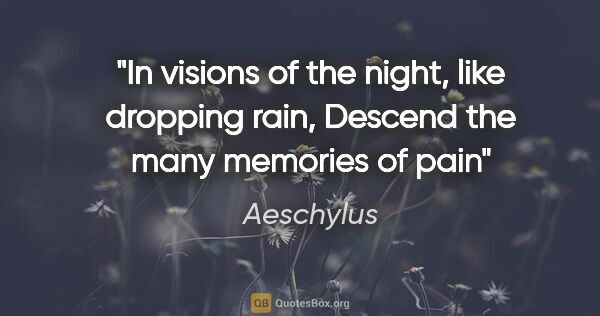Memory Quotes (page 64)
You have a... remarkable memory,” I say haltingly. “I remember everything about you,” says Peeta, tucking a loose strand of hair behind my ear. “You’re the one who wasn’t paying attention.”
“I am now,” I say.
“Well, I don’t have much competition here,” he says. I want to draw away, to close those shutters again, but I know I can’t. [...]“You don’t have much competition anywhere.
Suzanne Collins
For a long while- for many years, in fact- he had not thought of how it was before he came to the farm. His memory of those times was like a house where no one lives and where the furniture has rotted away. But tonight it was as if lamps had been lighted through all the gloomy dead rooms. It had begun to happen when he saw Tico Feo coming through the dusk with his splendid guitar. Until that moment he had not been lonesome. Now, recognizing his loneliness, he felt alive. He had not wanted to...
Truman Capote
There is never any ending to Paris and the memory of each person who has lived in it differs from that of any other. We always returned to it no matter who we were or how it was changed or with what difficulties, or ease, it could be reached. Paris was always worth it and you received return for whatever you brought to it. But this is how Paris was in the early days when we were very poor and very happy.
Ernest Hemingway

They can print statistics and count the populations in hundreds of thousands, but to each man a city consists of no more than a few streets, a few houses, a few people. Remove those few and a city exists no longer except as a pain in the memory, like a pain of an amputated leg no longer there.
Graham Greene
To find themselves utterly alone at night where company is desirable and expected makes some people fearful; but a case more trying by far to the nerves is to discover some mysterious companionship when intuition, sensation, memory, analogy, testimony, probability, induction -- every kind of evidence in the logician's list -- have united to persuade consciousness that it is quite in isolation.
Thomas Hardy
In trying to make the slave experience intimate, I hoped the sense of things being both under control and out of control would be persuasive throughout; that the order and quietitude of every day life would be violently disrupted by the chaos of the needy dead; that the herculean effort to forget would be threatened by memory desperate to stay alive. To render enslavement as a personal experience, language must first get out of the way.
Toni Morrison
